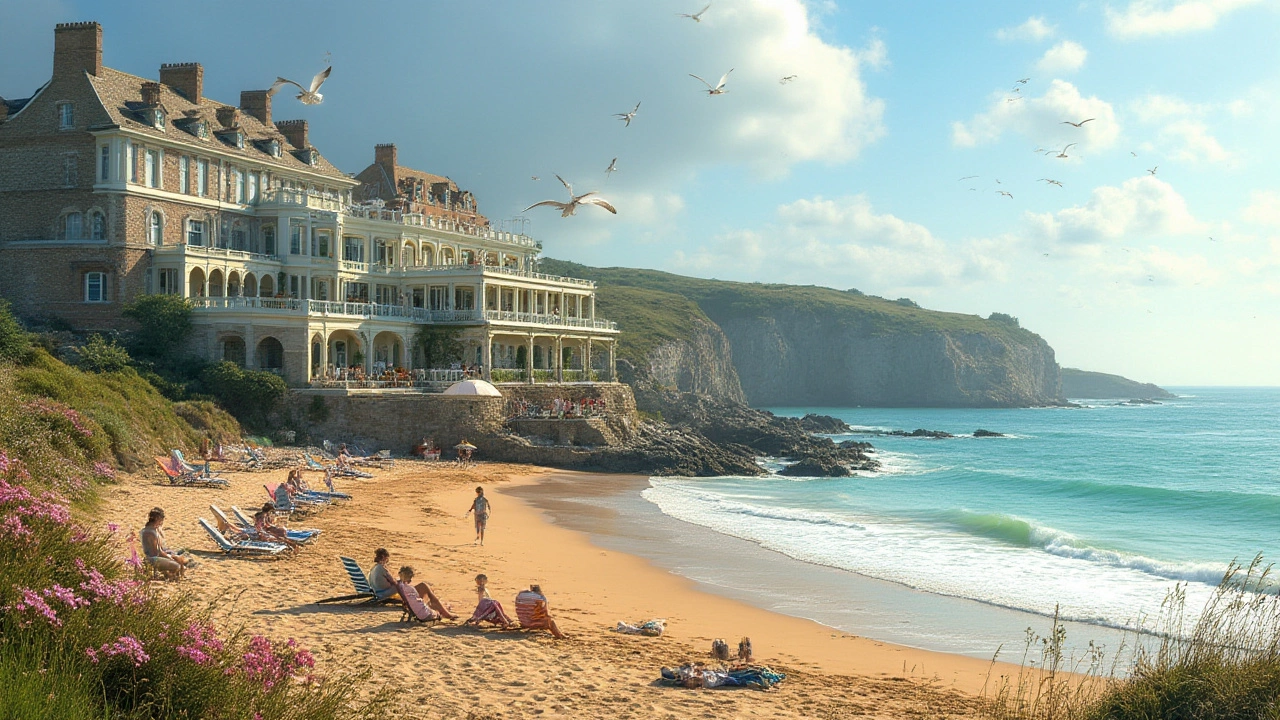Ever booked a holiday with the word “beach” in the name but ended up wondering where all the perks went? Loads of travelers get stumped by the difference between a beach hotel and a beach resort. On the surface, you’re by the sea—what more could you ask for? The details, though, are where things really come to life. Picking the right one can be the difference between a simple place to crash and an all-around seaside adventure. People actually plan their entire year around these getaways, and with good reason: Irish travelers alone made over 1.7 million trips abroad in the first quarter of 2025, many looking for that dream stretch of coastline. So, let’s break it all down—no faff, just facts and real experience, because sunburn and sand in your shoes are no fun, unless you get the memories to match.
What Makes a Beach Hotel?
Picture checking in, dropping your bag, and finding the sand only steps away. That’s the classic beach hotel vibe. At its core, a beach hotel is accommodation first and everything else second. You’ll always get the essentials—rooms with a beach view (if you luck out or pay a little more), on-site restaurants or bars, and the ease of knowing the sea is never far from your bed. Most of these places focus on clean, cozy comfort, reliable service, and maybe a pool for the days the waves are too wild. It’s all about the basics: a good night’s sleep and a clean shower after your swim, rather than endless activities or endless options.
One thing you’re likely to notice? Price. Beach hotels are generally more budget-friendly than resorts, mostly because you're not paying for extras you might never use. Want to pop in and out—or spend every daylight hour exploring nearby towns, tasting local food, or going on day trips? Hotels make a great home base. Urban beach hotels in cities like Nice, Miami, or Barcelona often feel like any other city hotel, just with a handy stash of towels for the sand and maybe a surfboard rack in the lobby.
Privacy varies—some places are buzzing with families and couples, while others are tiny, almost secret, perfect for solo travelers or anyone craving peace. You might not see a spa or a line-up of daily activities, but you also won’t find yourself dodging crowds all the time. In fact, smaller beach hotels can sometimes have the edge with location, slipping right onto the sand or even with their own tiny private beach. Still, keep expectations in check: think clean towels every day, good coffee in the morning, and the freedom to explore at your own pace. Forget about water slides, golf carts, or unlimited cocktails—unless you count the hotel bar’s happy hour.
The main perks? You control your day, your budget stays tight, and the experience feels more local. Plenty of travelers swear by this less-is-more approach. You also might get lucky with some unique extras—a sunrise yoga class, a paddleboard to borrow, or a deck for campfire nights. But overall, beach hotels are about letting the destination set the vibe, not the building itself. The real show is outside your window. So if you want to blend affordability with oceanfront access, and don’t need the all-day schedule of a cruise ship, the classic beach hotel could be just perfect.
Defining the Beach Resort Experience
Here’s where things get splashy. A beach resort isn’t just a place to sleep, it’s an entire playground with the ocean as the centerpiece. Picture sprawling grounds, dotted with palm trees, swimming pools that seem to multiply overnight, a dozen restaurants to choose from, and staff who know your name and your drink order. Some resorts even include their own stretch of private sand, just for guests. That’s the level of luxury and convenience we’re talking about.
Beach resorts deal in experiences, not just stay. Want to try kite surfing, or see if your backhand still works on a tennis court? How about morning pilates on a sun-drenched deck or an evening fire show under the stars? These places offer scheduled activities all day, often all included in what you pay upfront. Some even toss in kids’ clubs, themed parties, adventure tours, or soothing spa days. Think of places like Atlantis, Bahamas, or the mega-resorts on the Algarve—with options that cover every possible mood: lazy day or adrenaline rush, tranquil couples’ massage or rowdy pool volleyball tournaments.
Here’s a stat for you: in 2024, nearly 70% of bookings for major beach resorts in Spain, Greece, and Mexico included “all-inclusive” food and drinks. This can be a lifesaver for anyone who wants to let their wallet take a holiday too. You get breakfast by the pool, endless snacks, and maybe even tailored dining experiences without ever leaving the grounds. Resorts also love to pamper—they aim for the stress-free holiday, where you barely touch your wallet, worry about nothing, and simply choose which lounger to flop onto next.
And the size—wow. These places can feel like tiny villages, with shuttle carts to zip you to your room after dinner or little shops selling everything from sunhats to artisan jewelry. You’ll find staff everywhere, ready to teach a beach yoga class or arrange a sunset cruise. Family groups love this: you can relax with a book knowing the kids are supervised. But couples or solo travelers who crave peace often find “adults only” zones or boutique-style beach resorts, with candlelit dinners and nooks for watching the moon rise. The line between resort and theme park sometimes gets blurry, especially in places that promise “endless water fun” or host pool parties with live DJ sets. If you like the idea of a holiday where you don’t need to plan or think about a thing, this is your playground.
Of course, with this all-in approach comes price. Resorts are built for the “everything under one roof” escape, so you’re paying for convenience, variety, and usually an atmosphere that feels a little bit fantasy. Still, those extra touches—complimentary sunscreen, room service, picture-perfect grounds—make plenty of repeat guests. Booking at a resort is signing up for a certain style of holiday, much less about blending in with locals or exploring every hidden corner outside your resort walls. But what you lose in ‘local flavor,’ you gain a thousand times over in choice and ease.

Key Differences: Beach Hotel Versus Beach Resort
So, lining up the two side by side, what are you really getting? A beach hotel gives you a base camp—nice room, decent breakfast, maybe some sunset cocktails, and the ocean a stone’s throw away. It’s about making the most of a great location and having the freedom to set your own pace. If you like dipping into the city’s food scene, discovering off-the-beaten-path shops, or just want to spend every day down a new stretch of sand, this is the way to go.
The beach resort flips that script. It’s a contained world. You’ll have loads of things to do, often without setting foot beyond the gate. It’s part luxury, part non-stop entertainment, with a price tag to match. You’re paying for access to pools, activities, food, drinks, shows, spas—essentially everything most people dream about on holiday, wrapped into a single package. The trade-off? Less flexibility, and sometimes a little less of the local experience. But if you hate planning and want to avoid every little decision (“where will we eat tonight?” or “what will we do today?”), resorts are designed with you in mind.
To really spell it out, here’s a breakdown in a handy table. Just the facts, so you can compare at a glance:
| Feature | Beach Hotel | Beach Resort |
|---|---|---|
| Accommodation | Room only, occasional suites | Rooms, suites, villas, family units |
| Location | Near or on the beach | Often large estate, private beach access |
| Dining | 1–2 restaurants, basic bar | Multiple restaurants, bars, all-inclusive options |
| Facilities | Basic amenities, pool, sometimes gym | Pools, spas, kids’ clubs, gyms, shops, entertainment |
| Activities | Few, mostly beach-related | Wide range: sports, classes, water sports, shows |
| Price | From budget to high-end | Midrange to luxury, often higher |
| Atmosphere | Often quieter, more relaxed | Lively, social, sometimes bustling |
What trips people up most? The word “hotel” often sounds more glamorous than it is, while “resort” secretly means “pack your sunglasses and your best pool float, because you might not leave the grounds for a week.” Some hotels call themselves “resorts” and vice versa, so always check the actual list of services. Look for keywords like “all-inclusive,” “private beach,” “activity schedule,” or “adult-only areas.” And if you’re after more flexibility for day trips or a foodie adventure, or don’t like crowds, lean toward the hotel option. After all, the best seaside trip is the one designed for your vibe, not your neighbor’s Instagram feed.
Tips for Picking the Right Seaside Stay for You
If you’re still on the fence, you’re not alone. The line between hotel and resort keeps blurring, but your choice really just comes down to what you need from a holiday. Here are some things that can help you get it right without wasting money or missing out:
- Check the “extras”: If everything from meals to your morning coffee comes with a hidden charge at your chosen hotel, your budget holiday could balloon fast. Resorts tend to bundle more in the upfront price.
- Think about energy levels: Do you love a jam-packed schedule, or just a dip in the ocean after a nap? Resorts thrive on variety and activities. Hotels let you go at your own pace.
- Who’s coming? For families with kids, resorts are a lifesaver—kids’ clubs, lifeguards, and supervised activities mean you actually get a break. Couples or solo travelers might prefer the privacy and flexibility of a hotel, with more opportunity for authentic local experiences.
- Privacy and crowds: Boutique hotels on quieter beaches can feel secluded and romantic. Resorts, especially in peak season, bustle with energy. Decide what feels right for you.
- Be wary of names: There’s no strict global rule—some “resorts” are more like hotels with a pool, others deliver everything but the moon. Always dig into reviews, check the facility lists, and scan travelers’ photos rather than the brand’s best angles.
- Check transport: Resorts can be far from city action or public transport. If you like off-site exploring, make sure taxis or shuttles are plentiful (and not wildly expensive).
- Add a special touch: Sometimes, a beachfront hotel with amazing local partnerships—like surf lessons, eco tours, or even just a killer seafood shack next door—offers a richer slice of real life than any high-rise all-inclusive.
Word of mouth rules: ask around, dig through real-life reviews, and message that friend who never seems to work but always posts snaps of turquoise water. Don’t be shy about emailing the place with your questions—they want your booking every bit as much as you want a dreamy break. And remember, whether you pick a beach hotel or a beach resort, what counts most is you coming home with a headful of stories (and, if you did it right, a suitcase full of sand you’ll find for years after).
